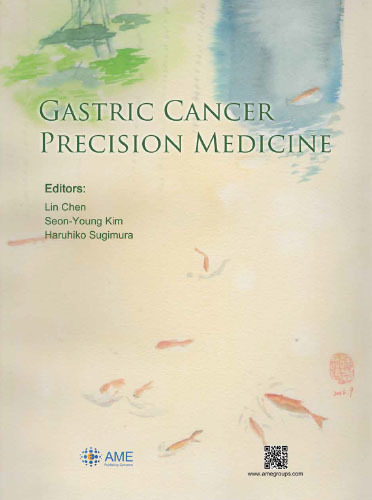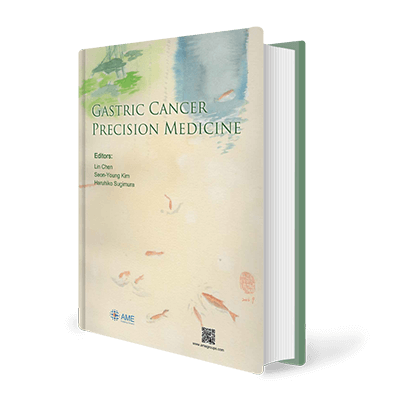
Gastric Cancer Precision Medicine
| Editors: | Lin Chen, Seon-Young Kim, Haruhiko Sugimura |
Publisher: AME Publishing Company; 1st edition (2017)
ISBN-13: 978-9887784111
Hardcover: 321 pages
Language: English
Gastric cancer is a major burden of disease, particularly in developing countries. To make things more complicated, differences are frequently observed in the ways gastric cancer patients are diagnosed and treated between developed and developing countries. Bridging such differences, therefore, is of utmost importance in facilitating communication and collaboration among physicians from both sides. One major initiative to achieve this goal is the joint publication of such academic books as Gastric Cancer Precision Medicine. Organizing international symposiums and conferences is another initiative to accomplish this so that various physicians can exchange their distinctive ideas with one another. For example, the 12th International Gastric Cancer Congress (IGCC) to be held in Beijing, China from 20th to 23rd April, 2017 would provide the experts and physicians worldwide with a promising platform to work together to bridge the differences and improve the management of gastric cancer.With the coordination of AME Publishing House, the present book invites worldwide experts from 16 countries, including the well-known professor Han-Kwang Yang from Korea and professor Seigo Kitano from Japan, to write this book. The content of this book is novel, covering biology, pathology, treatment and prognosis of gastric cancer, and discussing hot topics like minimally invasive gastric cancer, multidisciplinary team and immunotherapy.
Editors
| Lin Chen | Department of General Surgery, Chinese PLA General Hospital, Beijing 100853, China |
| Seon-Young Kim | Personalized Genomic Medicine Research Center, Korea Research Institute of Bioscience and Biotechnology (KRIBB), 125 Gwahak-ro, Yuseong-gu, Daejeon 305-806, Korea |
| Haruhiko Sugimura | Department of Pathology, Hamamatsu University School of Medicine, Hamamatsu, Japan |
Associate Editors
| Kecheng Zhang | Department of General Surgery, Chinese PLA General Hospital, Beijing 100853, China |
Table of Contents
Preface
Biology of Gastric Cancer
1 Identification of molecular subtypes and significantly mutated genes in gastric cancer using next- generation sequencing
4 Muscular metastasis from gastric cancer
7 KRAS, BRAF and gastric cancer
26 Implications of epithelial-mesenchymal transition in gastric cancer
33 The Cancer Genome Atlas output and practice of gastric cancer
36 Moving molecular subtypes to the clinic in gastric cancer
42 Molecular classi cation of gastric cancer
Pathology of Gastric Cancer
45 Gastric cancer: Classi cation, histology and application of molecular pathology
Treatment of Gastric Cancer
57 The era of laparoscopic surgery for gastric cancer: what is the present territory and what will be next?
60 Surgical management of gastric cancer: the East vs. West perspective
70 Ongoing clinical studies of minimally invasive surgery for gastric cancer in Japan
77 Ongoing surgical clinical trials on minimally invasive surgery for gastric cancer: Korea
83 Surrounding break up after Helicobacter pylori eradication to prevent metachronous gastric cancer after endoscopic submucosal resection
88 Long journey to prevent metachronous gastric cancer after endoscopic resection
91 Management of high-output chylous ascites after D2-lymphadenectomy in patients with gastric cancer: a multi-center study
97 Does the lymphadenectomy have no signi cant impact on gastric cancer patients with negative nodes?
99 Results of the REGATTA trial on surgical therapy of limited metastatic gastric cancer: open issues and future perspectives
103 Minimally invasive function-preserving surgery based on sentinel node concept in early gastric cancer
109 Endoscopic resection of early gastric cancer: current status and new approaches
119 Single incision gastrectomy for gastric cancer
126 Reduced port laparoscopic gastrectomy for gastric cancer
134 Laparoscopic splenic hilar lymphadenectomy for advanced gastric cancer
141 Laparoscopic D2 distal gastrectomy for advanced gastric cancer: a myth or a reality?
144 Laparoscopic gastric cancer surgery results in reduced wound complication and overall morbidity
147 Perspective of new techniques overcoming laparoscopic sentinel node biopsy for early gastric cancer
149 Survival impact of the number of lymph node dissection on stage I–III node-negative gastric cancer
152 Hybrid surgery for early gastric cancer
158 Neoadjuvant chemotherapy for locally advanced gastric cancer: the surgeon’s role
165 Cytoreductive surgery and hyperthermic intraperitoneal chemotherapy for gastric cancer and other less common disease histologies: is it time?
177 Excision repair cross-complementary group for chemotherapy ef cacy in gastric cancer
188 Cytokeratin 18 for chemotherapy ef cacy in gastric cancer
195 Treatment improvement by addition of leucovorin to S-1 plus oxaliplatin in patients with advanced gastric cancer
198 Postoperative chemoradiotherapy vs. preoperative chemoradiotherapy for locally advanced (operable) gastric cancer: clarifying the role and technique of radiotherapy
217 Emerging issues in multimodality treatment of gastric cancer
237 Expanding treatment options for metastatic gastric cancer
240 Use of positron emission tomography scan response to guide treatment change for locally advanced gastric cancer: the Memorial Sloan Kettering Cancer Center experience
249 Late recurrence of gastric cancer with isolated brain metastasis
253 Diagnostic and therapeutic strategies for gastric cancer in the era of precision medicine
261 Immunotherapy for advanced gastric and esophageal cancer: preclinical rationale and ongoing clinical investigations
Prognosis of Gastric Cancer
270 Long-term recurrence-free survival after hepatic resection for metachronous gastric cancer liver metastases
273 Quality of life versus survival bene ts in patients with HER-2 negative metastatic gastric cancer: exploration of the randomized trials from the patient’s perspective
276 Variations in outcome for advanced gastric cancer between Japanese and Western patients: a subgroup analysis of the RAINBOW trial
280 Ethnicity-related differences in tumor immunity: a new possible explanation for gastric cancer prognostic variability?
283 Survival in lymph node-negative gastric cancer: the Western experience
285 Survivin for chemotherapy ef cacy in gastric cancer


